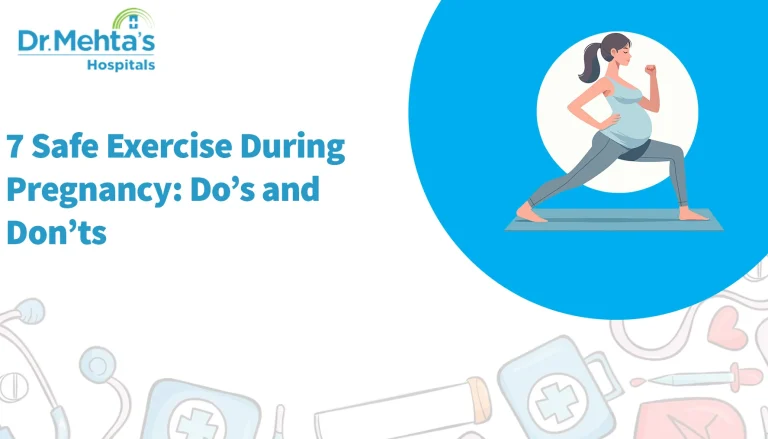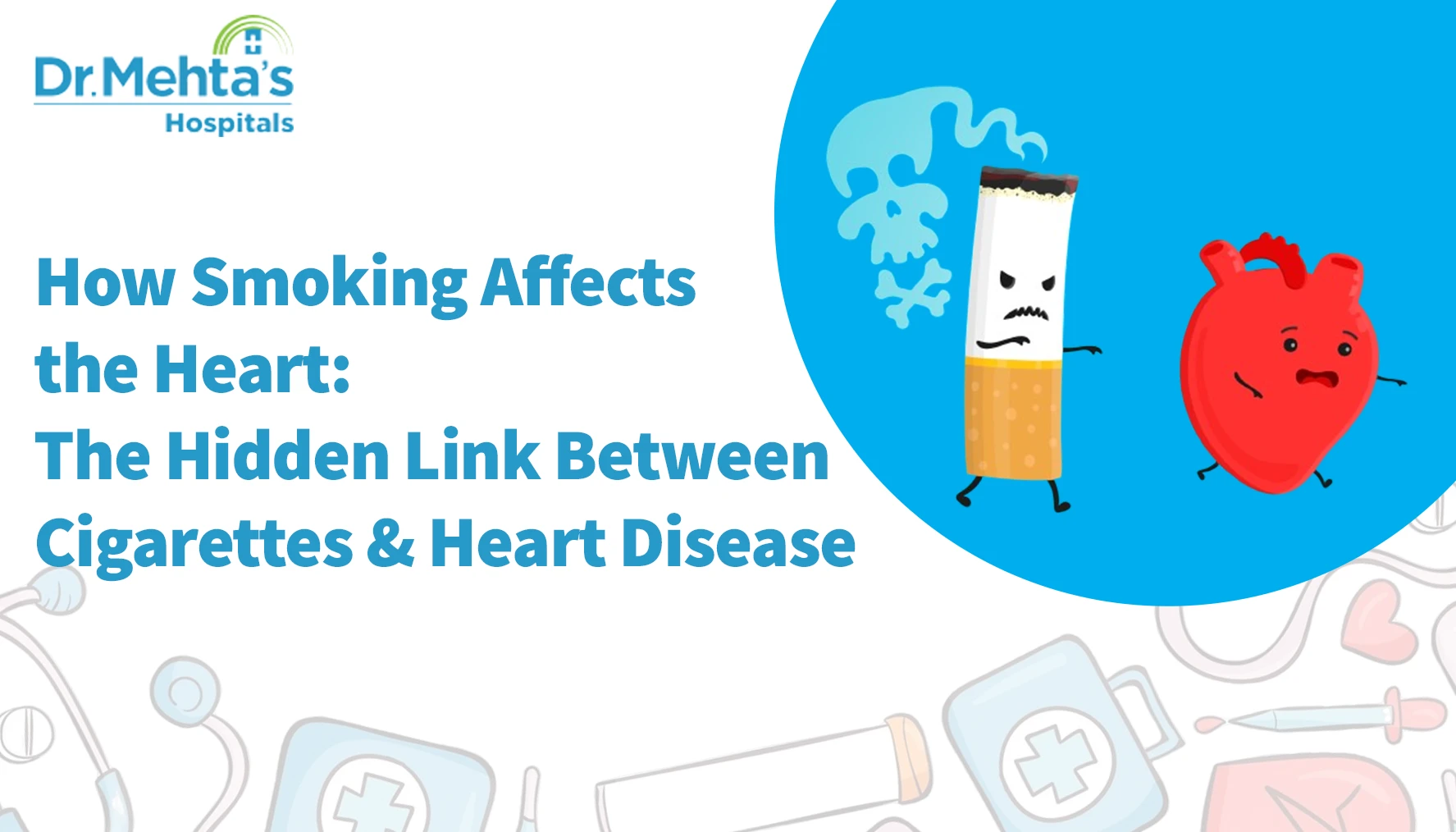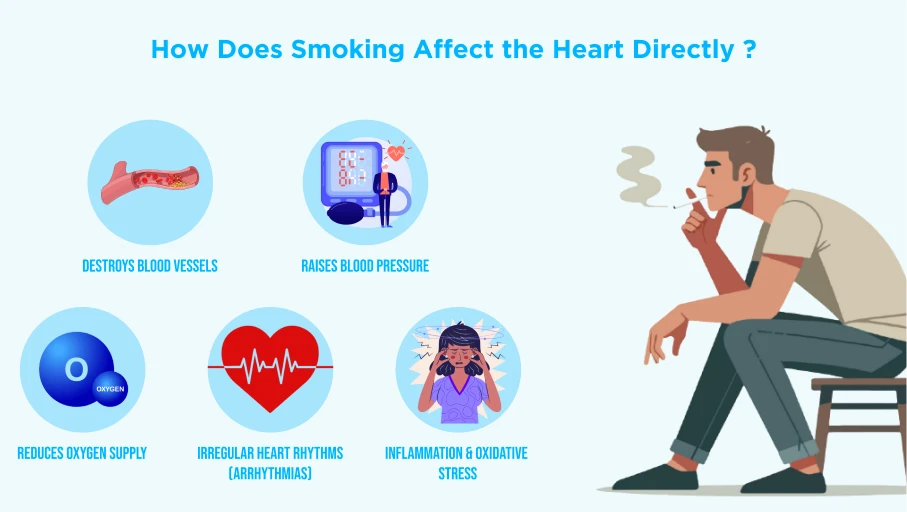
Table of Contents

While most people know smoking harms the lungs, fewer realise its silent and serious impact on the heart. Cigarettes damage not just your lungs but also disrupt your cardiovascular system.
Many people associate smoking with lung problems, but it’s even more harmful to the heart and blood vessels. Smoking silently damages the body, and symptoms often remain unnoticed until a serious event like a stroke or heart attack occurs.
This blog will discuss the impact of smoking on your heart, blood vessels, and health in general and what can be done to turn it back.
The link between smoking and heart disease is not only widespread but also well established. Smoking increases the rate of plaque formation in arteries, thickens the blood, and lowers the level of oxygen. These, in combination, will increase your cardiovascular risk by a significant amount.
Smokers are 2–4 times more likely to develop heart-related conditions such as heart attacks, strokes, and blocked arteries. Tobacco use is addictive and can cause severe health damage, even in young adults.
A review of cardiovascular disease in Asian Indians stated that smoking is estimated to increase the likelihood of death due to heart diseases by about twofold, and the incidence of heart diseases and the resultant deaths in India have been a leading cause of heart disease and atherosclerosis in India.
For many smokers, one of the earliest red flags of these underlying heart issues is unexplained chest discomfort, a symptom that shouldn’t be ignored, especially if it feels tight, heavy, or spreads to the arms and jaw. Understanding how such pain can present can help you decide when it’s time to seek urgent care. If you’d like to understand the warning signs of heart problems, you can read about the symptoms of a heart attack here.
Even one cigarette will increase your heart rate in a few minutes. Here’s why:
This constant strain gradually weakens the heart and increases the risk of long-term damage. In such cases, seeking timely intervention at the best hospital in Chetpet, Chennai can make all the difference, especially during cardiac emergencies.

So, how does smoking affect the heart? These are not just side effects, they are direct pathways to cardiovascular damage.
The toxins in cigarette smoke weaken and inflame the lining of your arteries. This:
Cigarettes have a number of health effects, such as high blood pressure and low elasticity of the arteries. That means:
Smoking introduces carbon monoxide into the blood, which binds to haemoglobin more readily than oxygen.. This decreases the amount of oxygen that the blood can carry and this means:
Cigarettes contain nicotine and other chemicals that overstimulate the nervous system, and they can cause arrhythmia or irregular heartbeat. This may cause:
Is Nicotine Bad for Your Heart?
Yes, nicotine is a great contributor to heart damage:
Nicotine is harmful even in non-smoking forms and should only be used under medical guidance. It’s best to consult the leading cardiologists in Chetpet to understand how nicotine or any cessation aid may affect your heart health.
The effects of smoking on the heart are far-reaching. Some of the most prevalent conditions associated with tobacco are as follows:
These problems among family members may also be caused by long-term exposure to passive smoke. It’s important to consult a general physician in Velappanchavadi if anyone in the household experiences symptoms linked to secondhand smoke.
The positive effects of quitting start in minutes and accumulate:
Quitting isn’t just about protecting your lungs, It is one of the greatest gifts you can give your heart and overall health. For personalized guidance and recovery, you can always seek support from the best hospital in Chennai for heart care.
There is no safe level of smoking when it comes to heart health. Whether it’s daily smoking or constant exposure to passive smoke, the damage builds up silently. But the positive news? As soon as you stop smoking, your heart begins to heal.
At Dr. Mehta’s Hospitals, we assist patients in heart screenings, recuperation plans, and evidence-based smoking withdrawal programs to avert and treat the cardiovascular diseases at any stage.
Table of Contents
Recent Post
About us
Dr. Mehta’s Hospitals is a leading multispecialty hospital in Chennai with over 90 years of excellence. With 400+ beds and 80+ specialties, its Chetpet and Velappanchavadi centers offer advanced, state-of-the-art, compassionate care under one roof.
Chetpet Contact Details
Velappanchavadi Contact Details
Feel free to ask your queries on
Our Specialities
About us
Dr. Mehta’s Hospitals is a leading multispecialty hospital in Chennai with over 90 years of excellence. With 400+ beds and 80+ specialties, its Chetpet and Velappanchavadi centers offer advanced, state-of-the-art, compassionate care under one roof.
Chetpet Contact Details
Velappanchavadi Contact Details
Feel free to ask your queries on
Our Specialities
Quick Links
Center Of Excellence